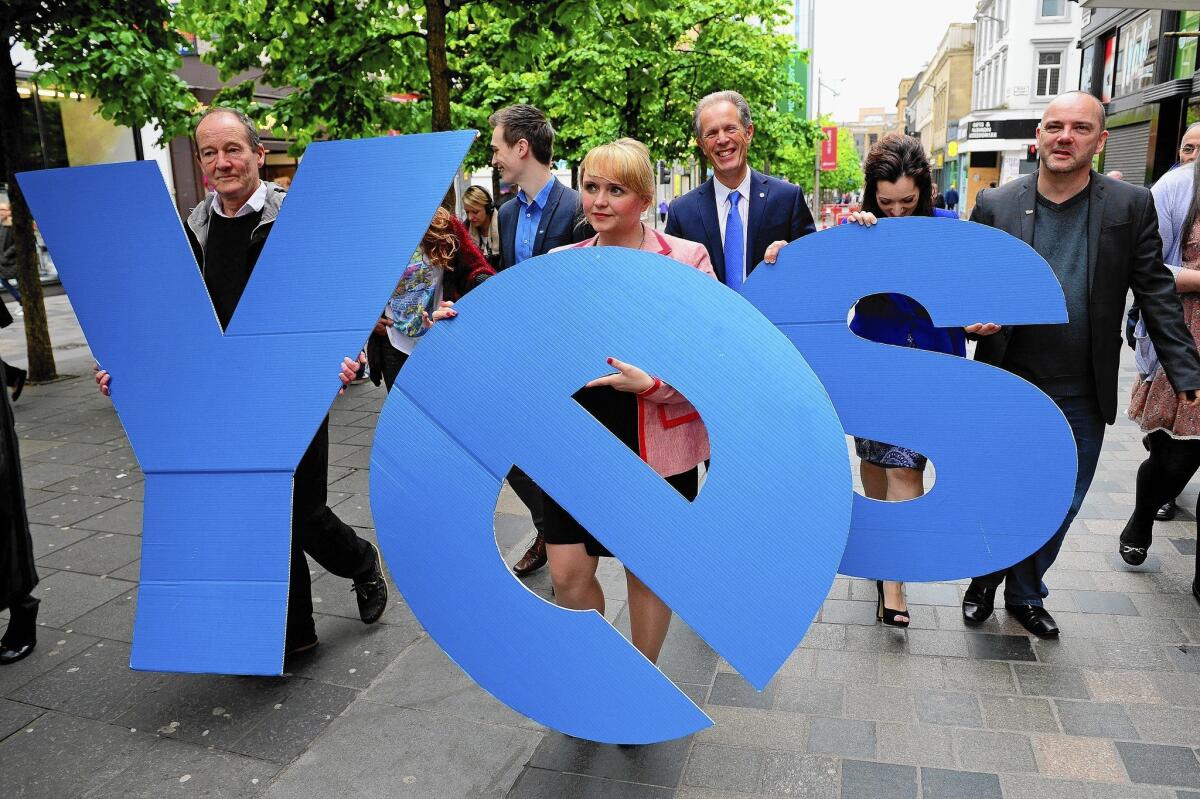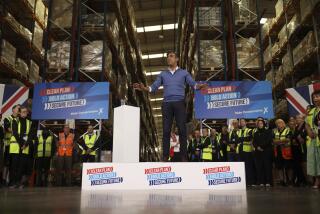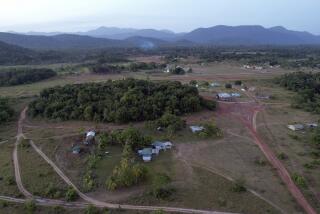Scotland’s expats want a say on independence from Britain

- Share via
Reporting from BERWICK-UPON-TWEED, England — From the time he was a wee lad on his grandpa’s knee, Ian Cowe had pride in his Scottish roots drummed into his bonny little head. Born in Edinburgh, he went to college there, spent part of his career in Scotland and joined the local Scottish cultural society when he was posted to Hong Kong.
So he takes great interest in the referendum that could change his homeland, and the rest of Britain, forever. In September, voters in Scotland will decide whether the time has come to split from England and Wales and form the world’s newest independent nation, without a single shot fired.
Cowe, 82, now lives in pleasant retirement in Berwick-upon-Tweed, England’s northernmost town. He can stand on the centuries-old ramparts and gaze across the border at Scotland just two miles away. He can get to Edinburgh by train — which he does once a week — faster than to the nearest English city, Newcastle-upon-Tyne.
What he can’t do is cast a ballot Sept. 18. Only people living in Scotland proper have the right to vote in the binding plebiscite, leaving “expatriate” Scots such as Cowe without a say in the matter, regardless of their family history, emotional ties or sense of Scottish identity.
“I wish that Berwick could vote,” Cowe says. “A lot of people, you could say, were stranded outside of Scotland.”
Though proud of his heritage, he wants Britain to stay intact. “I don’t like to see countries breaking up,” he says. “I worked in Yugoslavia, and that all fell to bits.”
There are about 733,000 people who were born in Scotland but now live south of the border in England and Wales, according to the 2011 census. Moving among the three parts of Britain — for love, work or fun — is as easy as moving among California, Oregon and Nevada.
But now these resettled Scots find themselves on the outside looking in as their birthplace faces perhaps the most momentous decision it will make during their lifetimes.
While some shrug, others chafe at being shut out. That frustration can cut especially deep for many in Berwick-upon-Tweed, a strategic border town whose history is as much Scottish as it is English. (“Berwick” is pronounced like “barrack.”)
During a 200-year stretch in the medieval period — long before the 1707 Act of Union that officially wed Scotland and England — the town changed hands between the rival kingdoms at least 10 times. It has legally been part of England since 1836, but a Scottish infantry regiment of the British army, the King’s Own Scottish Borderers, was garrisoned there until 2006.
The town’s soccer and rugby teams compete in Scottish leagues, bagpipers busk for money on the main drag and cafes sport names like Thistle Do Nicely, after the Scottish national emblem.
Plenty of Scots here care deeply about what lies ahead for their ancestral land after Sept. 18. They just can’t do anything about it.
“I don’t get a vote. I do mind, because I’ll live with the fallout from whatever happens,” says Pam Thompson, 53, a guesthouse owner who grew up on the Scottish side of the border but moved after marrying her husband.
Determining who can vote fell to Scotland’s semiautonomous, pro-independence government, which opted to run the referendum like a local election and limit voting to current residents of Scotland.
That spared officials the messy task of granting the vote based on some other, harder-to-measure notion of Scottish-ness. What qualifies a person as Scottish — pedigree, birthplace, ethnicity, upbringing? Should a man who has never set foot in Scotland, but who has Scottish ancestors and keeps Scottish traditions, be allowed to vote? How about a woman who was born in Scotland but who grew up elsewhere and feels no connection to it?
Restricting the vote to residents of Scotland inevitably raised the hackles of born-and-bred Scots living outside their homeland. On the list of those excluded from participating are former Wimbledon champion Andy Murray, who resides in England, and actor Sean Connery, who trumpets his ardent Scottish nationalism from his home in the Bahamas.
“It is a source of great regret that so many expatriate Scots are disenfranchised in this referendum,” Ian Lang, a former British Cabinet secretary in charge of Scottish affairs, declared in a recent speech in the House of Lords.
One young Scotsman in London has filed a formal complaint with the European Commission in Brussels, asking it to intervene and overrule the Scottish government. But Aidan O’Neill, a lawyer who has studied the matter, says a decision from the commission before the referendum takes place is unlikely.
On the flip side of the issue are the 500,000 residents of Scotland — 10% of the population — who were born in England, Wales and Northern Ireland and will be able to vote in the referendum.
By another quirk of the British law governing local elections, citizens of European Union countries living in Scotland are also eligible to cast a ballot, meaning that a Pole or Greek or Spaniard who arrived in Glasgow this year in search of a job can weigh in on Scottish independence.
Secessionists insist Scotland would be better off under its own management, able to pursue policies that residents favor — better welfare programs, expulsion of Britain’s nuclear submarines from Scottish lochs — but that get short shrift from the government in London. Oil from the North Sea and Scottish entrepreneurialism would make for a prosperous, dynamic economy, independence advocates say.
The “No” campaign remains ahead in the polls. “Harry Potter” creator J.K. Rowling, who lives in Edinburgh, recently came out in support of the unionist side, giving a $1.7-million donation that she hopes will work its magic to help hold Britain together.
John Gardiner, a candy store owner in Berwick-upon-Tweed, would vote no on independence if he could.
“Hypothetically, it’s a brilliant idea,” says Gardiner, 64, who left Scotland when he was 20 but still considers himself Scottish. “But in this day and age, when you look at what’s going on all over the world, all the factions and the nutters, it just bothers me.”
He and others worry that British society is becoming more polarized. Because of its strategic location on the River Tweed, Berwick-upon-Tweed was a political pingpong ball between Scotland and England for centuries, but it’s now a place where Scots and English, as well as other kinds of folk, live in a harmony they don’t want jeopardized.
The walls around the town built by Queen Elizabeth I to keep northern invaders out (as well as her cousin Mary, Queen of Scots) are part of history — and should stay that way, says Thompson, the guesthouse owner. There shouldn’t be any new walls put up, literal or metaphorical.
Members of Thompson’s family who still live in Scotland are divided on independence, with one of her nieces determined to vote yes but her brother and sister planning to vote no.
She herself can only watch anxiously from the sidelines as the land of her forebears decides its destiny without the benefit of her input.
“It’s not a big enough country to carry itself,” Thompson says. “We’ve got to stay united. We’re a British island.”
More to Read
Sign up for Essential California
The most important California stories and recommendations in your inbox every morning.
You may occasionally receive promotional content from the Los Angeles Times.













